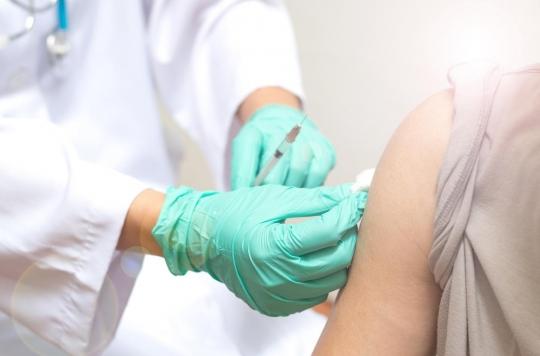According to new work, people who have been vaccinated against measles, mumps and rubella (MMR) have a lower risk of developing a severe form of Covid-19.

- People who have received the MMR vaccine against measles, mumps and rubella would develop specific antibodies that make them less at risk of developing a severe form of Covid-19.
- This inverse correlation between Covid-19 and igG, on the other hand, is not observed in people who have previously caught one of the three conditions protected by the MMR vaccine.
Long decried by the “antivax” movement for its supposed link with autism, the MMR vaccine, which protects against measles, mumps and rubella, has experienced an astonishing comeback since the start of the Covid-19 epidemic.
While last September, an observational study published in the journal allergy suggested that patients who received the MMR vaccine were less at risk of developing a severe form of Covid-19, a new study, this time published in mBioan open-access journal from the American Society for Microbiology, comes to the same conclusion.
In this new work, the researchers provide further evidence by showing that mumps type G immunoglobulins (igG) are inversely correlated with the severity of Covid-19 in patients who have previously been vaccinated with the MMR II vaccine produced by the Merck laboratory. MMR II contains the Edmonston strain of measles, the Jeryl Lynn (level B) strain of mumps, and the Wistar RA 27/3 strain of rubella, the study said.
“We found a statistically significant inverse correlation between mumps titers and Covid-19 severity in people younger than 42 who were vaccinated with MMR II,” says Jeffrey E. Gold, lead author of the study. ‘study. According to him, the fact that children receive their first vaccine between 12 and 15 months, then a second between 4 and 6 years “could also explain why children have a much lower rate of Covid-19 cases than adults, as well as a much lower death rate”.
An inverse correlation between antibodies and Covid-19
For this new work, the researchers recruited 80 subjects divided into two groups. In the first were 50 subjects who developed MMR antibodies from the MMR II vaccine. The second comparison group included 30 volunteers with no history of MMR II vaccination, but who had developed antibodies against all three conditions.
The researchers found a significant inverse correlation between mumps antibodies and the severity of Covid-19 in the MMR II group. In contrast, no significant correlation between mumps IgG and disease severity was found in the comparison group. No correlation with participant age or severity of measles, mumps and rubella was found in either group.
In the group that received the MMR II vaccine, mumps IgG titers of 134 to 300 AU/ml (n=8) were only found in those who were functionally immunized or asymptomatic. All those with mild symptoms of Covid-19 had igG titers below 134 AU/ml (n=17). All those with moderate symptoms had IgG titers below 75 AU/ml (n=11). Finally, all the people who were hospitalized and who required oxygen had mumps igG titers below 32 AU/ml (n=5).
Vaccinate people over 40
For David J. Hurley, professor and molecular microbiologist at the University of Georgia, and co-author of the work, this statistically significant inverse correlation between mumps titers and Covid-19 “indicates that there is a relationship at play that warrants further study”.
“The MMR II vaccine is considered a safe vaccine with very few side effects. While it has the ultimate benefit of preventing Covid-19 infection, preventing the spread of Covid-19, d to reduce its severity, or a combination of one or all of these, it is a very high-return, low-risk intervention Maximum seropositivity is achieved by two vaccinations to at least 28 days apart. Based on our study, it would be prudent to vaccinate people over the age of 40, whether or not they already have high MMR serum titers.”he concludes.

.















